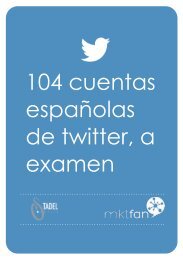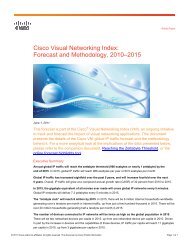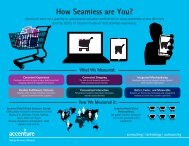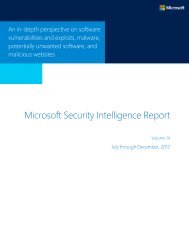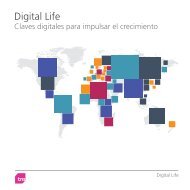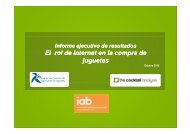Open Innovation 2.0 Yearbook 2013 - European Commission - Europa
Open Innovation 2.0 Yearbook 2013 - European Commission - Europa
Open Innovation 2.0 Yearbook 2013 - European Commission - Europa
Create successful ePaper yourself
Turn your PDF publications into a flip-book with our unique Google optimized e-Paper software.
78 O P E N I N N O V A T I O N 2 0 1 3<br />
roadworks or spontaneous events such as public<br />
transport strikes can also be available online [12].<br />
Geolocation data are especially important when<br />
they create an added social and economic value in<br />
combination with any other public sector information.<br />
In some cases, these data are available only<br />
for non-commercial or personal use; in other cases,<br />
there are fully open and interoperable data, which<br />
can be reused by Web developers to create new<br />
types of desktop and mobile applications for city<br />
mobility.<br />
In order to follow the trends, regulate cities’ mobility,<br />
evaluate the ICT impact on mobility issues<br />
and promote the best practices across the Member<br />
States, the EU institutions are setting up legal<br />
and conceptual initiatives containing some general<br />
rules.<br />
The aforementioned PSI directive of 2003 is one of<br />
the most tangible results of such commitment to<br />
support PSI openness and availability ( 1 ).<br />
<strong>Open</strong> data EU case: London urban mobility<br />
Currently, the United Kingdom is probably THE <strong>European</strong><br />
country where open data are getting the most<br />
attention from central and local governments and<br />
where the PSI directive was rigorously implemented<br />
and a truly open data strategy is enforced.<br />
As an international business, financial and cultural<br />
centre, the City of London is forced to optimise the<br />
public transport system. Most of the decisions concerning<br />
public transport system development in<br />
London are technical or urban by nature, but recent<br />
ICT technologies are also being used to help a modern<br />
megalopolis become more mobile and comfortable<br />
for citizens and visitors alike.<br />
In 2008, the UK Government launched a special<br />
plan, the pan-government initiative ‘UK Location<br />
Programme’; its main aim is to implement the EU<br />
INSPIRE directive [13] in a proper way, by improving<br />
the sharing and reuse of public sector location<br />
information.<br />
The main idea is to open PSI data sets as much as<br />
possible, and encourage entrepreneurs to reuse this<br />
open data information. The government decided<br />
that the process of sharing PSI data across the<br />
( 1 ) In this context, it is important to keep in mind that the meaning<br />
of ‘Public Sector Information’ (PSI) should not be confused<br />
with the meaning of ‘open data’. They are not necessarily synonyms<br />
especially when PSI is stored by governmental services<br />
and not open to other stakeholders such as citizens, commercial<br />
and non-commercial organisations. However, often PSI<br />
and open data definitions can overlap, and even be identical,<br />
in situations where public sector information is open access.<br />
country was so ineffective that people and official<br />
bodies were simply wasting time and money trying<br />
to get the information. The proposal was to<br />
improve the sharing opportunities through common<br />
interoperability standards and common Web<br />
infrastructures (websites in these terms). Moreover,<br />
according to this initiative, all the data should be<br />
updated regularly.<br />
Citizens and communities in general are encouraged<br />
to create and develop new PC and mobile<br />
applications or to improve already existing government<br />
services [14]. In parallel, government departments<br />
are encouraged to open their PSI. A guide is<br />
provided on how to publish data easily, and a website<br />
forum offers additional assistance [15]. The<br />
authorities also give some suggestions for potential<br />
apps based on all this PSI: traffic management,<br />
location-based services, and social-economic services<br />
are all mentioned as possible apps solutions.<br />
In June 2012, the UK Government published a new<br />
document, <strong>Open</strong> Data White Paper — Unleashing<br />
the Potential [16], emphasising the idea that ‘transparency<br />
is at the heart of the agenda for government’.<br />
The underlying principle of the UK Government<br />
is that ‘data that can be published should be<br />
published’; this distinguishes the United Kingdom<br />
and the ‘London case’ in particular. For this reason,<br />
each UK government department (from Environment,<br />
Food and Rural Affairs to Culture Media<br />
and Sport — a total of 14 departments) took the<br />
principle as a primary rule, and published its first<br />
ever open data strategies plans to open and publish<br />
new data sets with a 2 year perspective. Departments<br />
also stated how they are going to motivate<br />
a market and developers for the newly available<br />
open data.<br />
Access to the data is given with an <strong>Open</strong> Government<br />
Licence for PSI, which means that citizens,<br />
non-commercial, and even commercial, organisations<br />
can copy, publish, distribute, transmit and<br />
adapt presented data sets, as well as utilise the<br />
information commercially, including the possibility<br />
of combining it with other data sets and using it in<br />
their own products and services. The main conditions<br />
are attribution to the source of the information<br />
and a link to the <strong>Open</strong> Government Licence for<br />
PSI itself must be included. The licence does not<br />
cover any personal data or any information under<br />
the intellectual property rights law.<br />
It also provides for privacy and data security safeguards,<br />
stressing that personal data is anonymised<br />
and anonymous data sets are not altered. Finally,<br />
the authors of the White Paper proclaim that a shift



